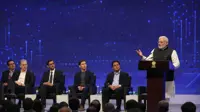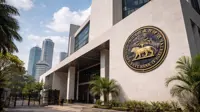Reserve Bank of India (RBI) governor Shaktikanta Das has expressed confidence in India’s resilience and capacity to overcome all odds even as the global economy is inexorably headed into recession under the weight of the economic crisis brought about by coronavirus.
“Covid-19, a virus of the size of 0.12 microns, has crippled the global economy, with more than 300,000 dead and economic activity across the world stalled. Once again, central banks have to answer the call to the frontline in defence of the economy,” the RBI governor stated while announcing the monetary policy measures.
It is a double whammy for Indian economy with the top 6 industrialised states that account for about 60 per cent of industrial output largely in red or orange zones, a collapse in demand beginning in March 2020 across both urban and rural segments, pointing to a collapse in both demand and production, RBI noted in its monetary policy review.
Investment demand has been virtually halted by a decline of 36 per cent in the production of capital goods in March, which was coincident with a contraction of 27 per cent in imports of capital goods in March and 57.5 per cent in April. This is also evident in a fall of 91 per cent in finished steel consumption in April and a 25 per cent shrinkage in cement production in March, all of which has taken a toll on government’s fiscal revenues.
Electricity and petroleum products consumption – indicators of day to day demand – have plunged into steep declines.
The biggest blow from Covid-19 has been to private consumption, which accounts for about 60 per cent of domestic demand. The production of consumer durables fell by 33 per cent in March 2020, accompanied by a 16 per cent decline in the output of non-durables. Similar indications are reflected in surveys of the fast moving consumer goods space.
Industrial production shrank by close to 17 per cent in March 2020, with manufacturing activity down by 21 per cent. The output of core industries, which constitutes about 40 per cent of overall industrial production, contracted by 6.5 per cent.
The manufacturing PMI for April recorded its sharpest deterioration to 27.4, spread across all sectors. The services PMI plunged to an all all-time low of 5.4 in April 2020.
Amidst this encircling gloom, agriculture and allied activities have provided a beacon of hope on the back of an increase of 3.7 per cent in foodgrain production to a new record. A ray of hope also comes from the forecast of a normal southwest monsoon in 2020 by the India Meteorological Department (IMD). Kharif sowing was higher by 44 per cent over last year’s acreage while Rabi procurement is in full flow in respect of oilseeds, pulses and wheat, benefiting from the bumper harvest. These developments will support farm incomes, improve the terms of trade facing the farm sector and strengthen food security for the country. Going forward, these would also have a salutary effect on food price pressures, he said.
The combined impact of demand compression and supply disruption will depress economic activity in the first half of the year. Assuming that economic activity gets restored in a phased manner, especially in the second half of this year, and taking into consideration favourable base effects, it is expected that the combination of fiscal, monetary and administrative measures being currently undertaken would create conditions for a gradual revival in activity in the second half of 2020-21.
Nonetheless, RBI said downside risks to this assessment are significant and contingent upon the containment of the pandemic and quick phasing out of social distancing/lockdowns. Given all these uncertainties, GDP growth in 2020-21 is estimated to remain in negative territory, with some pick-up in growth impulses from H2: 2020-21 onwards.
The end-May 2020 release of NSO on national income should provide greater clarity, enabling more specific projections of GDP growth in terms of both magnitude and direction. Much will depend on how quickly the Covid curve flattens and begins to moderate. As the nation prepares for this future, the words of Mahatma Gandhi should inspire us to fight on: “We may stumble and fall, but shall rise again…….”
RBI had earlier announced a special refinance facility of Rs15,000 crore to SIDBI at RBI’s policy repo rate for a period of 90 days for on-lending/refinancing. In order to provide greater flexibility to SIDBI, it has been decided to roll over the facility at the end of the 90th day for another period of 90 days.
To support capital markets, RBI said investments by foreign portfolio investors (FPIs) under the Voluntary Retention Route (VRR) has evinced strong investor participation, with investments exceeding 90 per cent of the limits allotted under the scheme. In view of difficulties expressed by FPIs and their custodians on account of Covid-19 related disruptions in adhering to the condition that at least 75 per cent of allotted limits be invested within three months, it has been decided that an additional three months time will be allowed to FPIs to fulfil this requirement.
The deepening of the contraction in global activity and trade, accentuated by the rapid spread of Covid-19, has crippled external demand. In turn, this has impacted India’s exports and imports, both of which have contracted sharply in recent months. In view of the importance of exports and imports to the economy certain measures are being taken to support the foreign trade sector.
In order to alleviate genuine difficulties being faced by exporters in their production and realisation cycles, it has been decided to increase the maximum permissible period of pre-shipment and post-shipment export credit sanctioned by banks from the existing one year to 15 months, for disbursements made up to 31 July 2020.
In order to enable EXIM bank to meet its foreign currency resource requirements, it has been decided to extend a line of credit of Rs15,000 crore to the EXIM Bank for a period of 90 days (with rollover up to one year) so as to enable it to avail a US dollar swap facility.
In order to provide greater flexibility to importers in managing their operating cycles in a Covid-19 environment, it has been decided to extend the time period for completion of outward remittances against normal imports (ie, excluding import of gold/diamonds and precious stones/jewellery) into India from six months to twelve months from the date of shipment for such imports made on or before 31 July 2020.
Besides extending the moratorium on loan repayments by another three months, RBI also decided to permit lending institutions to convert the accumulated interest on working capital facilities over the total deferment period of 6 months (ie, 1 March 2020 to 31 August 2020) into a funded interest term loan which shall be fully repaid during the course of the current financial year, ending 31 March 2021.
Also, in view of the current difficulty in raising resources from capital markets, the group exposure limit of banks is being increased from 25 per cent to 30 per cent of eligible capital base, for enabling corporates to meet their funding requirements from banks. The increased limit will be applicable up to 30 June 2021.
In order to ease bond redemption pressure on states, RBU has decided to relax the rules governing withdrawal from the CSF, while at the same time ensuring that depletion of the Fund balance is done prudently. Together with the normally permissible withdrawal, this measure will enable the states to meet about 45 per cent of the redemptions of their market borrowings, due in 2020-21. This change in withdrawal norms will come into force with immediate effect and will remain valid till 31 March 2021.




















